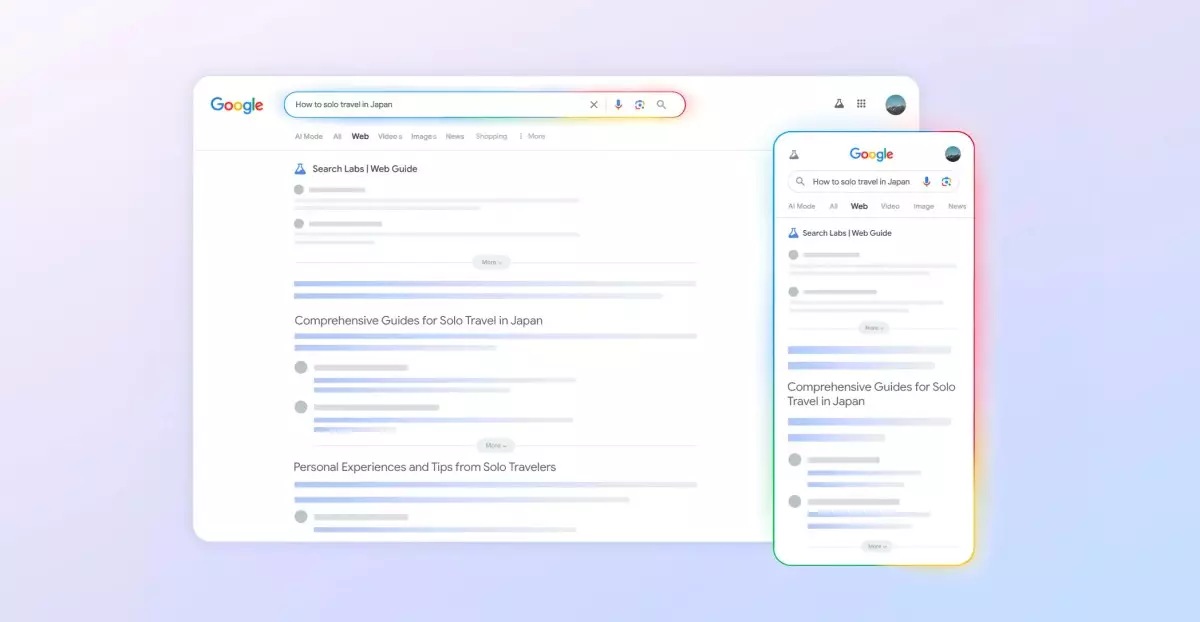Google’s recent introduction of Web Guide signals a significant shift in how we approach online search. This feature, powered by the company’s cutting-edge Gemini AI model, aims to move us beyond the monotonous routine of scrolling through a list of links. Instead, it endeavors to provide a more organized, intuitive, and context-aware search experience. In essence, Web Guide attempts to bridge the gap between the raw power of AI and the familiar, trust-based structure of traditional search results, which many users still find most reliable.
The core innovation lies in its categorization system, which intelligently clusters links into relevant groups—such as “Mango Tree Care in Specific Climates”—making the process of information retrieval more aligned with how humans naturally organize knowledge. This method simplifies the journey toward finding specific answers, especially when the query involves multiple facets or nuanced details. Yet, despite the promise, the execution leaves some room for critical scrutiny. The AI-generated summaries and headings, at times, seem redundant or superficial, offering insights that could be gleaned simply by clicking a link. This raises questions about whether Web Guide truly streamlines research or merely adds a layer of unnecessary complexity.
Balancing the Familiar and the New in Search Experiences
One of the most compelling aspects of Web Guide is its occasional adherence to traditional search elements. By presenting clickable links at the top, just like the classic “10 blue links,” it attempts to retain the trustworthiness users associate with familiar results. This hybrid approach reflects an understanding that, despite AI’s potential, users still value direct access to original sources. However, the accompanying AI summaries and categorized insights often feel like a superficial overlay—intended to add value but sometimes cluttering the clean simplicity users expect from Google.
There’s also a noticeable emphasis on AI’s capacity to handle complex, multi-layered inquiries. For instance, when asking about maintaining long-distance relationships, Web Guide assembles a diverse set of answers that span tools, emotional strategies, and social tips. This broadens the scope of traditional search, making it more conversational and more attuned to human needs. Yet, it resembles a digital concierge rather than a straightforward search engine—an approach that might influence user reliance on AI over independent exploration.
Implications for User Trust and Content Credibility
A critical question lurks beneath the surface of Web Guide’s technology: how does this influence the trustworthiness and diversity of information? Google’s partnerships, like the $60 million deal with Reddit, suggest a strategic move towards leveraging social media and community-driven content for training their AI systems. While this enriches the AI’s knowledge base, it also deepens concerns about content bias and the quality of sources prioritized.
By curating results into categories, Web Guide potentially filters user exposure to different viewpoints or niche expertise, depending on how the AI interprets relevance. The risk is that the algo may overly favor certain types of content—be it educational, social, or corporate—ultimately shaping perceptions in subtle ways. In an era where misinformation is pervasive, the trustworthiness of AI-curated results must be scrutinized more than ever. Users should remain vigilant, recognizing that these AI-driven categories and summaries are tools designed to guide—not replace—critical thinking.
Looking Forward: A Promising Yet Flawed Future
Ultimately, Web Guide exemplifies the ongoing evolution of search technology—one that strives to make information more accessible and digestible through AI. Yet, it also exposes the persistent challenge of balancing innovation with reliability. As users, our skepticism should extend to understanding that behind these AI interfaces lie complex algorithms that, while impressive, can sometimes oversimplify or distort the richness of human knowledge.
While the feature’s ability to organize cluttered search results into meaningful segments is promising, it’s essential to remember that no AI can perfectly replicate the nuanced understanding a human expert or careful researcher offers. Inspired by the push for smarter search, users must cultivate a discerning eye, questioning what is presented, analyzing the sources, and resisting the comfort of easy answers. As Google invests heavily in refining Web Guide, it’s clear that AI will shape the future of information retrieval—yet how much we trust and rely on it will ultimately determine whether it becomes a helpful guide or a misleading shortcut.

